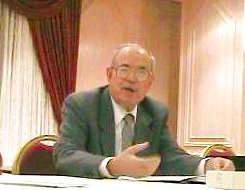Dr. Mohammed Abu-Hassan,
former justice of the Jordanian Supreme Court
16-sep-03, 9:40 pm
We meet Dr. Abu-Hassan in
our hotel conference room.
He gives us a prepared lecture on the Islamic influences on Western
jurisprudence.
[Apologies for my spotty notes...]

In the 9th and 10th centuries, Europe had no city with a population
larger than 30,000, except for Constantinople.
99% of the population was illiterate. At that time, Islamic Cordoba
had a population of 1/2 to 1 million, and had 12 large public libraries.
Each of these libraries was an order of magnitude larger than anything
in Christian Europe.
In 10th century Cordoba, there were
300 public schools, and there were 27 free schools for the poor.
"The Univrsity is a pure creation of Arabic Civilization".
[I didn't get the citation...]
The University of Cordoba had Jewish professors on the faculty.
The very idea of a university
originated in the Islamic world; the Greeks and Romans
didn't have them.
Sicily was under Islamic rule for 400 years. The Normans took Sicily but
kept the administration intact. William the Conqueror took his
Islamic-educated staff with him
to England to create the administration of his newly conquered country.
The founder of Oxford University was educated at Cordoba University.
English Common Law and the Magna Carta were both influenced by this.
(He sites Barnes
"History of Western Civilization" as a source for all this.)
Unique to Islam (according to Dr. Abu-Hassan) is Sharia, the intersection of
legality and morality. Breaking the law is a sin, not just a
civil violation. There are many schools of thought within Sharia.
Equality: racism is explicitly banned by the Koran.
The idea of international law was founded by an Islamic scholar,
Grotius was his pupil. Limitations on warfare, adherence to
treaties, and bans on harming civilians were all Islamic ideas.
(He sites "Islamic Origins of Civil Law" -- I missed the author's name.)
French Law: Pope Sylvester II (of the 10th century) graduated from Cordoba
University in Islamic Law.
He translated a body of Islamic legal texts into Latin and called
it the "New Roman Law" to avoid controversy about its source.
This code was the basis for the Napoleonic Code, the basis of the French legal
system (and also that of Louisiana).
(He noted that Europeans often translated Arabic texts without attribution.)
Islamic law was the first to distinguish between criminal intent and action.
That is, it did not prosecute children or the insane because they could
not harbor criminal intent.
Dr. Abu-Hassan also cited the Arabic inventions that enabled modern
navigation, like the astrolabe and the lateen sail.
[Much of this was information already familiar to me, so I didn't bother
to add it all to my notes.]
We finally break up at 11:00.
Some of Dr. Abu-Hassan's claims seem extreme, but much of it I already
know to be true.
|